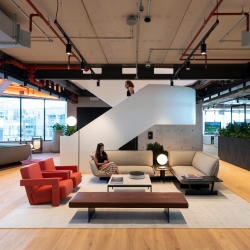June 16, 2021
Seminar will explore the route to a great workplace culture
 The events of the past 16 months have focussed attention on how we best bring people together to work, collaborate and learn from each other. That is why workplace occupancy and collaboration technology specialist Jooxter has curated a new webinar to help firms understand the challenges and opportunities they have in the new era of dispersed collaborative work. The webinar will explore how they can best bring people together, offer them a world class workplace experience and achieve great results. A panel of experts will discuss the evolution of hybrid working and how to create a team culture for better collaboration.
The events of the past 16 months have focussed attention on how we best bring people together to work, collaborate and learn from each other. That is why workplace occupancy and collaboration technology specialist Jooxter has curated a new webinar to help firms understand the challenges and opportunities they have in the new era of dispersed collaborative work. The webinar will explore how they can best bring people together, offer them a world class workplace experience and achieve great results. A panel of experts will discuss the evolution of hybrid working and how to create a team culture for better collaboration.







 When considering a hybrid working method for your organisation, it’s far too easy to try think of what will work for all employees as a whole, rather than breaking this down and thinking about the different needs from certain groups of people. One example of this is age and experience. Employees from different age groups and at different levels of experience within in an organisation may have very different needs when it comes to hybrid working. Those who have been with the business, or in a similar work environment, for some time may be perfectly comfortable to work from home the majority of the week, with little help or supervision. However, this probably isn’t going to work as well for younger employees with less experience.
When considering a hybrid working method for your organisation, it’s far too easy to try think of what will work for all employees as a whole, rather than breaking this down and thinking about the different needs from certain groups of people. One example of this is age and experience. Employees from different age groups and at different levels of experience within in an organisation may have very different needs when it comes to hybrid working. Those who have been with the business, or in a similar work environment, for some time may be perfectly comfortable to work from home the majority of the week, with little help or supervision. However, this probably isn’t going to work as well for younger employees with less experience. 
 A new report from the RSA and Vitality warns of the potentially serious impact on the long-term physical and mental health of employees. The authors claim that the ‘long lockdown effect’ should lead employers to see health and wellbeing as important strategic issues and place them on the company’s risk registers. With the shift to more flexible working cultures now set to continue,
A new report from the RSA and Vitality warns of the potentially serious impact on the long-term physical and mental health of employees. The authors claim that the ‘long lockdown effect’ should lead employers to see health and wellbeing as important strategic issues and place them on the company’s risk registers. With the shift to more flexible working cultures now set to continue, 
 Taunton’s UK Hydrographic Office Headquarters was named ‘Best of the Best’ at the British Council for Offices’ (BCO) National Awards, and also took home the ‘Corporate Workplace’ award. The office was joined by six other award winners recognised as leading examples of excellence in the office space. This ‘roll of honour’ includes two buildings in London: The Brunel Building on Canalside Walk, and 160 Old Street, a refurbished office space in the “Silicon Roundabout” district.
Taunton’s UK Hydrographic Office Headquarters was named ‘Best of the Best’ at the British Council for Offices’ (BCO) National Awards, and also took home the ‘Corporate Workplace’ award. The office was joined by six other award winners recognised as leading examples of excellence in the office space. This ‘roll of honour’ includes two buildings in London: The Brunel Building on Canalside Walk, and 160 Old Street, a refurbished office space in the “Silicon Roundabout” district. 


 Employees feel they need to go back into the office in order to be promoted according to new research conducted within the “Reinventing Work” chair at
Employees feel they need to go back into the office in order to be promoted according to new research conducted within the “Reinventing Work” chair at 
 HR leaders, heads of real estate and IT decision-makers have not always spent huge amounts of time working together – their roles and responsibilities have often been siloed. But in the new world of work, that’s all changing. These three groups of senior leaders are being asked to collaborate on one of the biggest challenges corporate occupiers, as they try to figure out when and how to return to office-based working and shape the future of work. Failure to collaborate will increase the probability of workplaces having low occupancy rates, low employee engagement and decreased productivity.
HR leaders, heads of real estate and IT decision-makers have not always spent huge amounts of time working together – their roles and responsibilities have often been siloed. But in the new world of work, that’s all changing. These three groups of senior leaders are being asked to collaborate on one of the biggest challenges corporate occupiers, as they try to figure out when and how to return to office-based working and shape the future of work. Failure to collaborate will increase the probability of workplaces having low occupancy rates, low employee engagement and decreased productivity. 
 Research from
Research from 


 When it comes to conversations about work and workplaces, the past year has offered a fully immersive experience. Everybody now has an opinion. Inevitably some of them are better informed and more rooted in experience than others. So, after a full year of talk and as we return to some form of routine working life, the time has come to take stock. Few organisations and people will remain untouched by the sudden shift in attitudes towards working life, so we asked four workplace experts for their views on the current state of play.
When it comes to conversations about work and workplaces, the past year has offered a fully immersive experience. Everybody now has an opinion. Inevitably some of them are better informed and more rooted in experience than others. So, after a full year of talk and as we return to some form of routine working life, the time has come to take stock. Few organisations and people will remain untouched by the sudden shift in attitudes towards working life, so we asked four workplace experts for their views on the current state of play. 







June 16, 2021
We need to rethink the role of technology in corporate wellbeing
by Brendan Street • Comment, Technology, Wellbeing